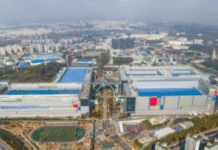Seoul— Samsung Electronics reported a 21.7% year-over-year jump in net profit for the first quarter of 2025, fueled by robust smartphone sales, particularly its latest Galaxy S25 series. However, the company’s semiconductor division continued to face headwinds due to sluggish demand in the high-bandwidth memory (HBM) segment.
In a regulatory filing on Wednesday, the South Korean tech giant announced a net income of 8.22 trillion won ($5.7 billion) for the January–March period, beating analysts’ expectations of 5.17 trillion won. Operating profit rose 1.2% to 6.68 trillion won, while revenue climbed 10% to an all-time quarterly high of 79.14 trillion won.
The standout performer was Samsung’s DX division, which includes smartphones, TVs, and home appliances. Sales in this segment surged 28% year-over-year to 51.7 trillion won, with the mobile business contributing 37 trillion won in sales and 4.3 trillion won in operating profit.
“The Galaxy S25 launch in January clearly helped drive momentum,” the company said in its statement.
By contrast, the semiconductor division struggled, posting a 17% drop in sales to 25.1 trillion won, with operating profit at just 1.1 trillion won. The company cited weak performance in the HBM sector, an area where rival SK hynix currently leads.
Samsung anticipates a stronger second half, contingent on easing global economic uncertainty. “Assuming market conditions stabilize, we expect improved performance in H2 2025,” the company noted.
To capitalize on the rising demand for AI-driven computing, Samsung plans to scale up production of premium memory products, including 12-layer HBM3E and LPDDR5X chips. It is also in talks with customers about its upcoming sixth-generation HBM4 memory, which it aims to mass-produce in Q2.
In the mobile segment, Samsung is preparing to launch the ultra-slim Galaxy S25 Edge in June, followed by the next-gen Galaxy Z foldables in July.
However, executives cautioned that rising geopolitical tensions and uncertain U.S. tariff policies could impact business operations. “We’re closely monitoring the situation and will rely on our global manufacturing network and customer relationships to remain agile,” said CFO Park Soon-cheol during the earnings call. (Source: IANS)








